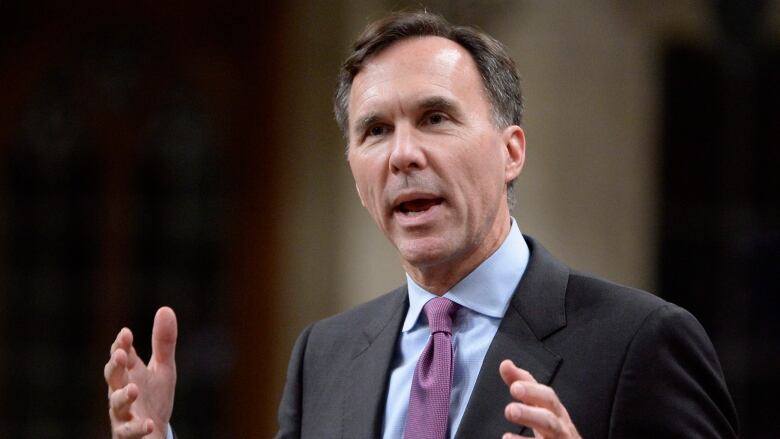4 tweaks Ottawa could make to settle nerves around proposed tax changes
Some ways the government can soften the blow to small businesses

When Finance Minister Bill Morneau announced proposed tax changesin July, he said he expected some push-back, but it's clear the Liberals did not expect the shove to be quite this forceful.
The Liberalssay they're open totweaks based on what they've heardduring the 75-day consultation period, but they've been vague on which areas might be changed when that period ends Monday.
"We've heard some concerns that we agree with and some concerns that we don't agree," Prime Minister Justin Trudeau said earlier this week.
But in an appearance atthe House of Commons finance committee Thursday, Morneau revealed, to some extent, which voices have been heard above the fray: farmers.
"Nothing in what we're proposing is intended to change the ability of a family member work on the farm, nothing is intended to in any way limit the farmer's ability to save for that investment...and nothing is intended for it to make it more difficult for the farmer to pass the farm to the next generation," said Morneau.
Here are four possible tweaks experts say finance officials could consider, to help farmers and other small business owners.
1. Exempt intergenerational business transfers
One of the proposals is designed to stop private corporations from converting corporate income, which would be taxed at a higher rate, to capital gains, which is taxed at a lower rate.
While some use this vehicle to game the system, there are those who use this mechanism to sell all or part of the family business to their children for example, to keep a farmin the family. The new rules would increase their tax rate from25 per cent to between40 and 45 per cent.
"Canadian families can't afford the tax bill to sell to their children if they were in that situation," said Todd Nixon, a fourth-generation dairy farmer in Osgoode, Ont. If they sold to someone outside the family, he said, the taxable income would be subject to the lower tax rate, making it cheaper to sell to a stranger than family.
The Finance Departmentanticipated this might be a problem and noted soin its written proposal, asking for ideas for how to better accommodate "genuine intergenerational business transfers while still protecting against potential abuses."
One option is to simply exempt such transfers, and develop a test to make that distinction and not just for farmers.
"I don't think it's rocket science to make an exception to this anti-avoidance rule," said Robert Kepes, a tax lawyer at Morris, Kepes, Winters in Toronto. "And to me, I don't think they should distinguish between farmers and entrepreneurs who are carrying on [family]business."
2. Minimum-number-of-employee threshold
The Liberals say the number of professionals such as doctors and lawyers who are registered as private corporations has increased from 1.2 million in 2001 to 1.8 million in 2014.
They also say a significant numberhave done so to shield company profits from a dividend tax by putting them into so-called passive investments, meaning theyremaininside the company.
When the investment is eventually withdrawn, the profits are taxed. But until then, the ability to invest the larger, pre-tax amount gives them an unfair advantage over business owners who tookprofits out of their companies.
Business owners say they need to build passive investmentvalue for a rainy day.Morneau has said he has some sympathy for the rainy-day argument since businesses have their ups and downs.
But the government also says it wants toencourage businesses to reinvest their money rather than sit on it. To soften the blow, the government could allow some passive income to continue being taxed at the lower rate if the business had aminimum number of employees, or number of hours worked by employees (since some could bepart-time).
That could prove the business is really an active one and not just a shelter for investment income.
3. Clarify reasonableness test for 'income sprinkling'
The Finance Department says about 50,000 family businesses are "income sprinkling" inappropriately. In other words, some business owners are transferring income to family members who aren't actively involved in the business and who are in a lower tax bracket. Owners also face a lower tax rate on their reduced declared income.
The government is proposing a reasonableness test to determine whether a relative is truly earning their pay or dividend. The test will consider labour contributions, capital contributions and previous remuneration. But many small businesses say the criteria leavetoo much to subjective judgement by a Canada Revenue Agency auditorand it makes them nervous.
"Is it only reasonable if my mother comes and does barn work?" asks dairy farmer Todd Nixon. "Or if she's running around and picks up parts for us?Do we have to document every little thing? 'Cause in a family business, everybody contributes all the time [in some way]."
Nixon and others wantthe government to be more specific about what it takes to pass the test.
4. Transitional tweaks
The passive income and income sprinkling measures, if passed, would not be retroactive.
Experts say, however,much estate or retirement planning was done based on the current rules and it's unfair to change those rules mid-game.
The proposed change to intergenerational business transfers would beretroactive to July 18, when the measure was announced, which would capturetransfers that were mid-process.
A gradual transition into some of the rules, for some businesses, might soften the blow.












_(720p).jpg)


 OFFICIAL HD MUSIC VIDEO.jpg)
.jpg)



























































































